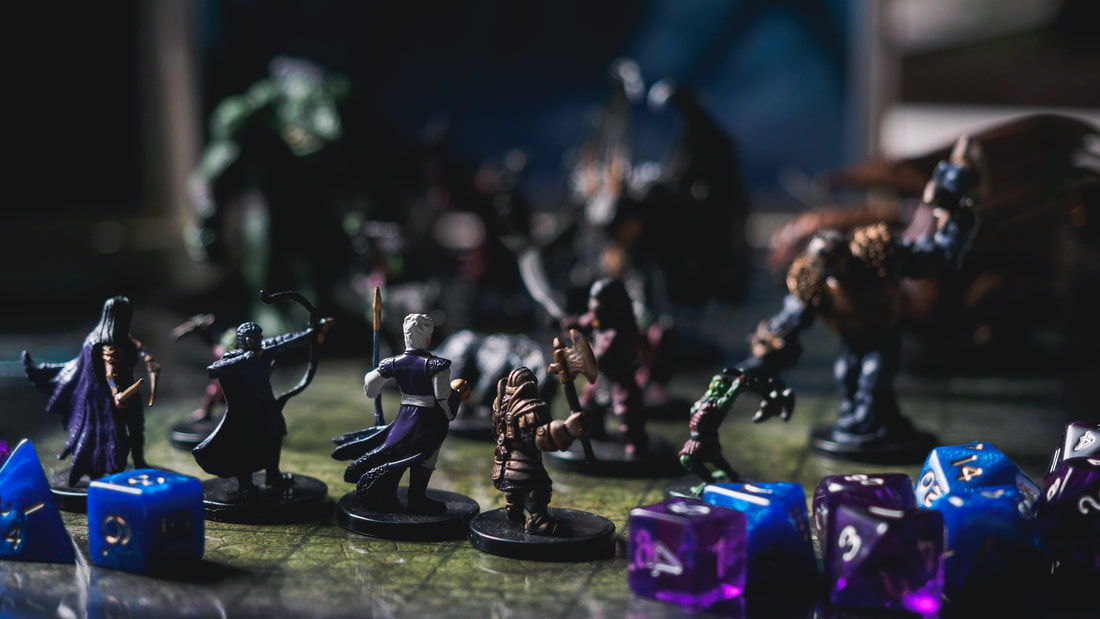|
When I first started out, my first contact with RPGs was when I tried to read and run the adventure found in the D&D 5e starter box and failed miserably after the first encounter. So, when I finally sat down to play a game run by someone else, I quickly realised how underprepared I was, with binders full of printouts, handouts, notes and God knows what else at his disposal I quickly adjusted my perspective. The next time I took a stab at being GM for the same adventure I came more prepared, I soon realised that my group was not that interested in D&D and it fell apart rather quickly. I did learn that preparation is vital when running a game for others, so whether you’re a brand spanking new GM or a seasoned veteran hopefully you can find something useful in this list.
1) Notepad & Pen This may be fairly obvious but it is the cornerstone of running a game, besides the rules and any supplements, so that you can quickly jot down anything that comes up or you need readily available, such as the names of the PCs, the alignment if you are playing D&D or aspects of the PCs if you are playing FATE. 2) Extra Dice Perhaps another fairly obvious one but having extra dice can really speed things along, from that one member of your group who always forgets their dice, to that overpowered character that needs 6d12s to roll for his very circumstantial damage. Extra dice can never go wrong, unless you have way too many then it’s just silly. So carrying an extra couple of sets of whatever dice you are using for your game should become a habit, just in case they are needed, and if not at least you can choose your favourite set. 3) Index Cards Torn bits of paper work for this one as well but to really show off, have index cards to write secret messages for just one player or to display some information that everyone needs readily available such as the number of turns before the tunnel collapses. In FATE, any scene or environment aspects can be written on cards for easy reference. Index cards can be used for a variety of different needs so I always have a pack in my gear just waiting to go. 4) Portable Whiteboard Or Chalkboard This is probably the most optional piece of kit for me as you either use it or you don’t. I use mine in some games to communicate layouts, zones, small maps, aspect lists and anything I might need to remember about the PCs and their abilities, which is also useful for the other players to see. For me this can easily be replaced by a reusable battle mat and the index cards but I enjoy having the A3 whiteboard to doodle on if my players just can’t get their heads round what i’m describing. 5) Counters & Tokens Having a ready supply of counters or tokens has many advantages: knowing who has Bardic Inspiration to use, as FATE points, to indicate status effects. I even used little counters that I wrote on to indicate how many and of what level spells my D&D players had, so when they used one of their first level spells they would give me the counter and would regain it after the appropriate rest. This worked well but I wasn’t that great at the D&D magic system, having just read the manual and jumped right into playing with other people who didn’t have any clue about the magic system either… it did not end well. 6) Good Friends Good friends are key to helping one become a good GM. A good friend gives positive criticism, not just pointing out flaws, but helping you work on trouble spots by offering ways to improve upon the running of the game. A good friend will add to your experience instead of draining your will to run a game, and will aid in the game creation by giving you hints as to what they expect from the game and the group. 7) Printer This is the most expensive piece of kit, but one of the most useful. Anything from character sheets to handouts, rules to campaigns... I’ve printed it all. If you don't own one ask your group if anyone does and ask to use it from time to time. Offer them ink for their trouble! Whatever the case, make use of this item. I recently used mine to print the entire rulebook for D100 Dungeon. If you don't have access to a printer then check out your local library. They usually have one they let the public use for a small fee per page. Whether or not you take any of these things to your game just make sure that you have fun and focus on the positives, don't get disheartened by problems you run into or players you wish you hadn’t invited. Learn from your mistakes and move forward with your skills, and keep in mind that not everything is good for every game. Find out what your players want from a game and tailor your equipment toward achieving that goal. Ross Reid is a keen roleplayer and GM who enjoys all things FATE and lots of things that aren't, In October he ran a game spread over three days totaling 24 hours for a children's hospital charity.
Sara clark
15/11/2018 10:16:40 am
Yep. This article totally nails it! Good to know these are shared experiences!
Reply
Leave a Reply. |
All blog materials created and developed by the staff here at High Level Games Archives
April 2023
Categories
All
|
Proudly powered by Weebly




 RSS Feed
RSS Feed